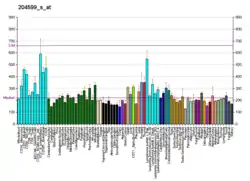MRPL28
39S ribosomal protein L28, mitochondrial is a protein that in humans is encoded by the MRPL28 gene.[5][6][7]
Mammalian mitochondrial ribosomal proteins are encoded by nuclear genes and help in protein synthesis within the mitochondrion. Mitochondrial ribosomes (mitoribosomes) consist of a small 28S subunit and a large 39S subunit. They have an estimated 75% protein to rRNA composition compared to prokaryotic ribosomes, where this ratio is reversed. Another difference between mammalian mitoribosomes and prokaryotic ribosomes is that the latter contain a 5S rRNA. Among different species, the proteins comprising the mitoribosome differ greatly in sequence, and sometimes in biochemical properties, which prevents easy recognition by sequence homology. This gene encodes a 39S subunit protein, a part of which was originally isolated by its ability to recognize tyrosinase in an HLA-A24-restricted fashion.[7]
References
- GRCh38: Ensembl release 89: ENSG00000086504 - Ensembl, May 2017
- GRCm38: Ensembl release 89: ENSMUSG00000024181 - Ensembl, May 2017
- "Human PubMed Reference:". National Center for Biotechnology Information, U.S. National Library of Medicine.
- "Mouse PubMed Reference:". National Center for Biotechnology Information, U.S. National Library of Medicine.
- Robbins PF, el-Gamil M, Li YF, Topalian SL, Rivoltini L, Sakaguchi K, Appella E, Kawakami Y, Rosenberg SA (Jun 1995). "Cloning of a new gene encoding an antigen recognized by melanoma-specific HLA-A24-restricted tumor-infiltrating lymphocytes". J Immunol. 154 (11): 5944–50. PMID 7751637.
- Koc EC, Burkhart W, Blackburn K, Moyer MB, Schlatzer DM, Moseley A, Spremulli LL (Nov 2001). "The large subunit of the mammalian mitochondrial ribosome. Analysis of the complement of ribosomal proteins present". J Biol Chem. 276 (47): 43958–69. doi:10.1074/jbc.M106510200. PMID 11551941.
- "Entrez Gene: MRPL28 mitochondrial ribosomal protein L28".
Further reading
- Kawakami Y, Robbins PF, Wang RF, et al. (1998). "The use of melanosomal proteins in the immunotherapy of melanoma". J. Immunother. 21 (4): 237–46. doi:10.1097/00002371-199807000-00001. PMID 9672845.
- Martin J, Han C, Gordon LA, et al. (2005). "The sequence and analysis of duplication-rich human chromosome 16". Nature. 432 (7020): 988–94. doi:10.1038/nature03187. PMID 15616553.
- Gerhard DS, Wagner L, Feingold EA, et al. (2004). "The Status, Quality, and Expansion of the NIH Full-Length cDNA Project: The Mammalian Gene Collection (MGC)". Genome Res. 14 (10B): 2121–7. doi:10.1101/gr.2596504. PMC 528928. PMID 15489334.
- Ota T, Suzuki Y, Nishikawa T, et al. (2004). "Complete sequencing and characterization of 21,243 full-length human cDNAs". Nat. Genet. 36 (1): 40–5. doi:10.1038/ng1285. PMID 14702039.
- Zhang Z, Gerstein M (2003). "Identification and characterization of over 100 mitochondrial ribosomal protein pseudogenes in the human genome". Genomics. 81 (5): 468–80. doi:10.1016/S0888-7543(03)00004-1. PMID 12706105.
- Strausberg RL, Feingold EA, Grouse LH, et al. (2003). "Generation and initial analysis of more than 15,000 full-length human and mouse cDNA sequences". Proc. Natl. Acad. Sci. U.S.A. 99 (26): 16899–903. doi:10.1073/pnas.242603899. PMC 139241. PMID 12477932.
- Kenmochi N, Suzuki T, Uechi T, et al. (2001). "The human mitochondrial ribosomal protein genes: mapping of 54 genes to the chromosomes and implications for human disorders". Genomics. 77 (1–2): 65–70. doi:10.1006/geno.2001.6622. PMID 11543634.
- Daniels RJ, Peden JF, Lloyd C, et al. (2001). "Sequence, structure and pathology of the fully annotated terminal 2 Mb of the short arm of human chromosome 16". Hum. Mol. Genet. 10 (4): 339–52. doi:10.1093/hmg/10.4.339. PMID 11157797.
- Suzuki Y, Yoshitomo-Nakagawa K, Maruyama K, et al. (1997). "Construction and characterization of a full length-enriched and a 5'-end-enriched cDNA library". Gene. 200 (1–2): 149–56. doi:10.1016/S0378-1119(97)00411-3. PMID 9373149.
- Maruyama K, Sugano S (1994). "Oligo-capping: a simple method to replace the cap structure of eukaryotic mRNAs with oligoribonucleotides". Gene. 138 (1–2): 171–4. doi:10.1016/0378-1119(94)90802-8. PMID 8125298.




